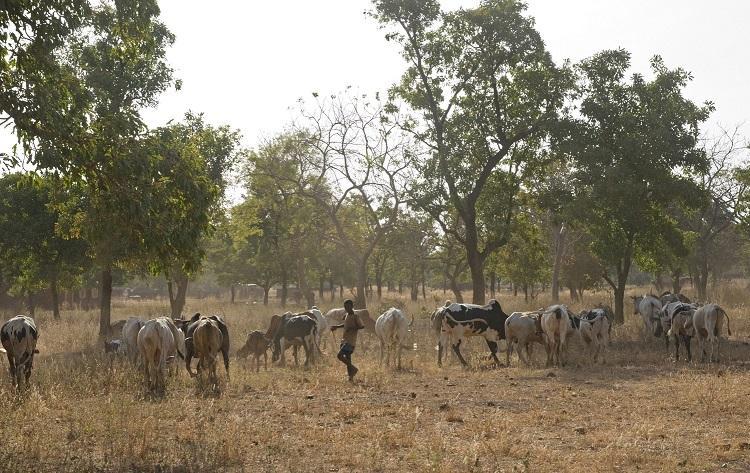- Home
- Worldwide
- CIRAD worldwide
- Projects
- 3F project
Feeding the soil and feeding the cow to feed the people - 3F

Grazing in the dry season: searching for biomass (Houet province, Burkina Faso, end of November 2016) © Rik Schuiling / TropCrop-TCS
Issues
As part of the intensification of agro-sylvo-pastoral systems, increasing and optimizing the ecosystem services provided by biodiversity delivers some good results. Farmers in Burkina Faso are used to managing biodiversity, because their farming systems are characterized by a high level of genetic diversity, given their traditional practices of intercrops and agroforestry. This project intends to take another look at these traditional local practices, based on recent advances in agronomy and ecology, through the co-design of novel agroecological technologies.
Description
The project is focusing on better biomass management, leaving producers to choose between feeding the soil and feeding their livestock. In particular, it aims to make use of agro-biodiversity and assess its effects on nourishing the soil, livestock and populations at different levels.
- At plant level: introduce diversified varieties adapted to association, resistant to witchweed and gall midges, with worthwhile qualities for livestock feed.
- At plot level: define associated systems (species and variety) that promote better use of resources, better pest control, and diversify incomes.
- At farm and landscape level: optimize fluxes (biomass, resource- nutrient/water, income) and characterize the importance of trees in controlling pests, and fluxes studied at farm level (biomass, income, nutrient).
Expected impacts
- Farmers take on board the techniques, adopt improved genetic material and the system management options;
- Farmers improve their livelihoods;
- Household vulnerability is thus reduced, thanks to greater food security combined with more resilient agrosystems;
- The institutional capacities of the national breeding institutes and national agricultural research institutes are strengthened, to support the long-term improvement of associated crops.























